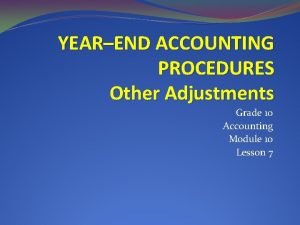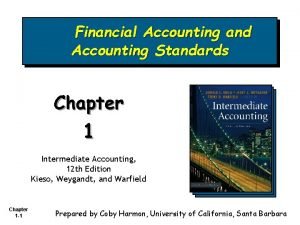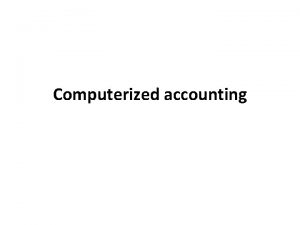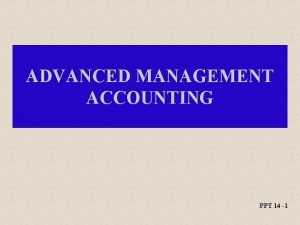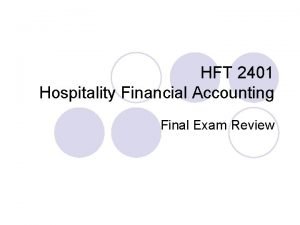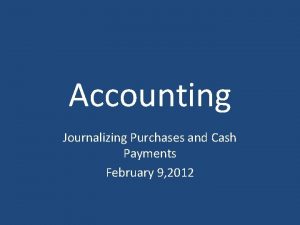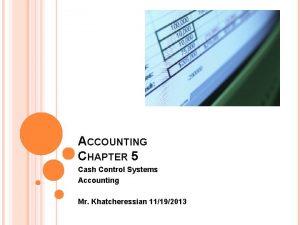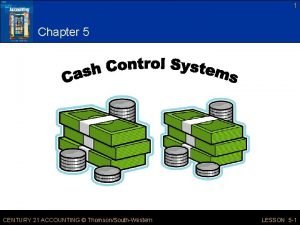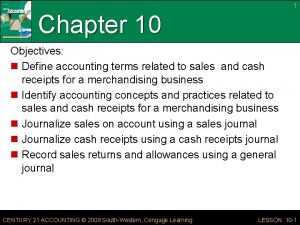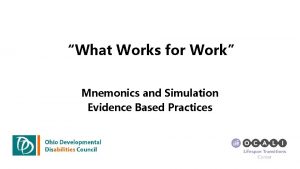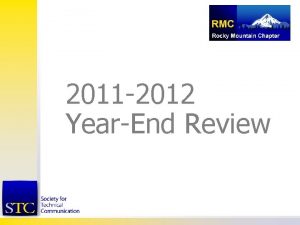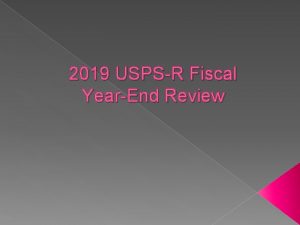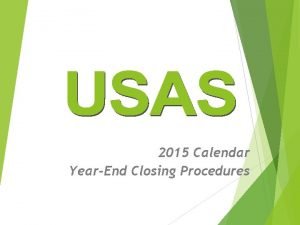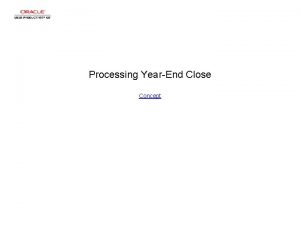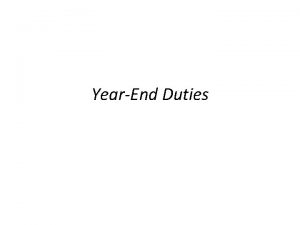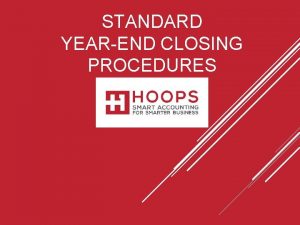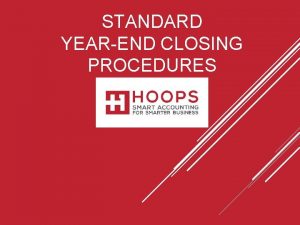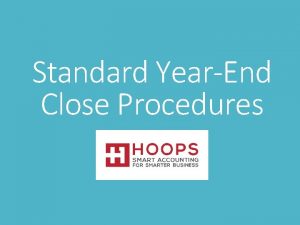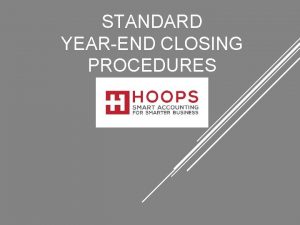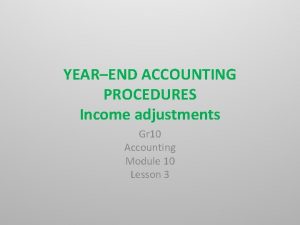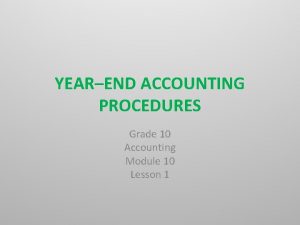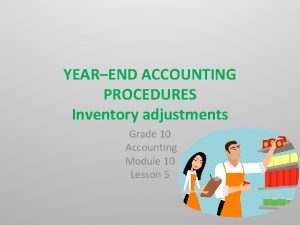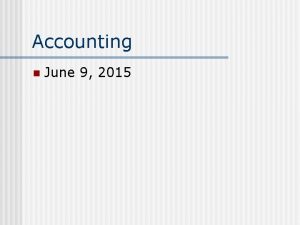2020 YearEnd Accounting Review June 10 2020 Year
























- Slides: 24

2020 Year-End Accounting Review June 10, 2020

Year End Calendar https: //www. emich. edu/controller/accounting/ year-end-dates. php

Department Close (Final Close) • Department Close (final close) will take place for fiscal year 20 on Thursday, July 30 th. Any adjustments that need to take place must occur before final close. • What should I do to make sure that I’m ready for final close? • Review your department accounts in Eprint or in Self Serve (My. Emich). • Send any issues to General Accounting with enough time before final close for those issues to be resolved. • Look for expenditures that are misclassified or revenue that needs to be moved.

Deposits and Touch. Net • Final deposits for fiscal year 20 are due on Friday, June 26 th. • This applies to both deposits that need to be entered into Touch. Net Web Deposit and to Deposit vouchers turned in to Student Business Services. • Reconciling items also need to be resolved by Friday, June 26 th. Accounting regularly contacts departments with reconciling or outstanding items. Contact Christine Swirple (cswirple@emich. edu) to resolve reconciling or outstanding items. • What should I do if I have a large deposit that is received between Friday June 26 th and Tuesday June 30 th? • Contact Christine Swirple in Accounting will work with you to ensure that deposit is recorded in the correct fiscal period.

Deposits and Touch. Net • Deposits can still be completed at this time using the secure drop box behind Pierce (next to Swoop’s pantry). • Complete the deposit voucher at https: //www. emich. edu/sbs/basics/forms. php • Place the voucher in an envelope along with your deposit and it will be processed by SBS staff. • Currently deposits are processed once per week on Wednesdays.

Using Account and Program Codes • Deposits will ALWAYS go to an Account Code that starts with zero (0) • Program Code for deposits is 99 • Fund/Org/0 xxx/99/Activity/Location (FOAPAL) • See the General Accounting tab on the Controller’s website for a list of account codes. https: //www. emich. edu/controller/accounting/bannerfinanceca. php

Account Hierarchy Report

Funds • General – These funds primarily represent two revenue streams - State Appropriations and Tuition and Fees. • Designated – These are unrestricted funds that have been designated for a specific purpose. Considered a subset of the General Fund, usually short term. • Auxiliary – Funds reported in this group represent self-supporting operating units that furnish goods and services to students, faculty, staff, and in some instances, the general public and may charge a fee directly related to that service. • Restricted – Grants, Scholarships and Development funds funded and restricted by a non-University source. • Plant – This fund group is used to account for the acquisition, construction, and maintenance of the University's physical plant and to control the resulting assets. • Agency – Moneys held by an institution acting as custodian or fiscal agent (Student Organizations).

Foundation Funds • Foundation funds are donor restricted funds. Endowed funds are assigned a spending budget from the EMU Foundation each year. • The endowed spending budgets are on a “use it or lose it” basis for each fiscal year. It is important to make a good faith effort to spend the budget each fiscal year. • Foundation funds may not have a negative balance. • If you have questions about your foundation fund budget, please contact Sandy Mullally at (smullall@emich. edu).

Indirect Cost (IDC) Funds • IDC Funds are used to distribute real costs of the University charged to sponsored grants & projects. The University shares back a portion of the IDC charged to grants with the project’s Principal Investigators (PIs)/Project Directors (PDs), their departments, colleges, and divisions. • IDC recovery funds are shared back to PIs/PDs and supporting units to further research and scholarly/creative activity. This may include hiring student research assistants, supporting conference travel, buying equipment or supplies that support one’s scholarly work. IDC recovery funds should be spent within two years of being generated. PIs/PDs cannot use these funds to support additional compensation, nor assign release time to their IDC funds. • Roll up of IDC Funds for terminated PIs/PDs: the Controller’s office has been instructed by the Office of the Provost to roll funds for which the PI or PD has been terminated up to the Provost’s IDC fund.

Student Organization Funds • All Student Organizations were requested to transfer fund balances to an external checking account (in the name of the Student Organization). • Due to COVID-19, the deadline to transfer the funds was extended to May 31, 2020. • Any remaining balances in Student Organization funds will be transferred to Campus Life by June 30, 2020. • After June 30, 2020, Student Organizations will need to work with Campus Life for fund transfer requests. • https: //www. emich. edu/controller/accounting/gastudentorgs. php

Budget Roll-forward for D and R Funds • Budgets for D and R funds (also PO’s, Requisitions, and General Ledger balances) will roll forward on Friday, July 31 st. Budgets will be available to spend on those funds by the end of business that day. • Reminder: Budgets for G & A funds are managed by the Budget office. Budgets for D and R funds are based on funds received and are managed by General Accounting (except for Grant funds). Project funds (U funds) are also managed by General Accounting.

Surplus/Deficit Reports • The Surplus Deficit report provides the available balance as of month end for each fund. The report also provides a snapshot of the activity in the fund. • Surplus/Deficit reports are provided for non-grant R & D funds each month. The distribution of reports is based on the assigned Fund Manager in Banner. • Self Service Banner (SSB) budget queries can be used to view live data and to drill down into balance details. • If the Available Balance is highlighted in red, the fund is in deficit. Designated funds that have not had activity within the last 24 months will have their balances moved to the department General fund, unless other arrangements have been made with General Accounting. Transfers to the General fund due to non-activity will occur in mid-December. • If you have questions about your surplus/deficit report contact General Accounting at (busfin_generalaccounting@emich. edu).

Surplus/Deficit Reports

Transfers: What Is Not Allowed • Expense transfers are NOT allowed, except for Sponsored Research and Grant funds. • Fund transfers and budget transfers (G to G) are allowed within the guidelines. • Fund Transfers Guidelines for what is NOT allowed: • G to D (General Fund to Designated Fund) • G to R (General Fund to Restricted Fund) • A to D (Auxiliary Fund to Designated Fund) • A to R (Auxiliary Fund to Restricted Fund) • D to R (Designated Fund to Restricted Fund) • U to X (Plant Fund to Agency Fund) • X to U (Agency Fund to Plant Fund) The above list only includes major highlights for transfer rules. For a complete list please go to: https: //www. emich. edu/controller/accounting/expense-transfers. php

Accrual-Based Accounting • In accordance with GAAP (Generally Accepted Accounting Principles), EMU is required to follow accrual based accounting. • Under the accrual basis of accounting, the focus is to report what revenues were earned and what expenses were incurred using deferrals and accruals. • A deferral occurs when EMU has: • Paid out money that should be reported as an expense in a later accounting period (ex: Subscriptions) • Received money that should be reported as revenue in a later accounting period (ex: Summer Tuition Fees) • An accrual is the means of either recording: • Revenues that have been earned, but not yet recorded or received (ex: Past due rent owed to EMU) • Expenses that have been incurred, but have not yet been invoiced or paid/recorded in the general ledger (ex: Construction project not yet invoiced) • This accounting method allows EMU’s financial statements to accurately reflect the current fiscal year revenues and/or expenses.

Why Do We Do Accrual Based Accounting? • Although it is more complicated than the Cash Basis Method of Accounting, there are specific advantages to Accrual Based: • The ability to “match” revenues and related expenses within the applicable periods. • Creates consistency to when revenues and expenses of EMU are recorded and allows for an increased ease of budgeting and forecasting. • If EMU is looking for financing opportunities, banks and other investors usually ask for the financial information in this method of accounting.

Deferred Revenue • Deferred or “Unearned” Revenue is money received by EMU in advance of having earned the revenue. • It is considered “unearned” as it refers to cash received prior to the work or service being performed. • The unearned balance is reported on our balance sheet as a liability and then recognized as a revenue in the correct period.


Prepaid Expenses • Prepaid Expenses refers to a cost that has been incurred, but which has not yet been used. • The cost is recorded as an asset until the goods or services are used, then the cost is recorded as an expense. • Record the expense to account code A 180. • Examples of Prepaid Expenses: • • • Software subscription Annual membership dues Travel (PCard) – flight booked now, taken in 6 months


Accrued Expenses • Accrued Expenses are expenses that have been incurred, but not yet paid for. In other words, these expenses are paid after they are recorded into the General Ledger at year end. • These expenses are reflected on the balance sheet as a liability for the period they are incurred, but are removed once they are paid. • Examples of Accrued Expenses might include: • Interest • Rent • Utilities • Paid Time Off • Salaries • Services rendered during the prior fiscal year invoiced in the following fiscal year • https: //www. emich. edu/controller/accounting/gaforms. php

EMU Financial Statements

Let us know if you have any questions!
 New irpwm june 2020
New irpwm june 2020 Poem for y6 leavers
Poem for y6 leavers Year end adjustments grade 10
Year end adjustments grade 10 Adjustments in accounting grade 10
Adjustments in accounting grade 10 Mid year budget review
Mid year budget review End of year review objectives
End of year review objectives Amway review 2013
Amway review 2013 Mid year budget review
Mid year budget review The study of linguistics
The study of linguistics Financial accounting chapter 1
Financial accounting chapter 1 What are the features of computerized accounting software *
What are the features of computerized accounting software * Accountin principles
Accountin principles Responsibility accounting ppt
Responsibility accounting ppt Hft accounting
Hft accounting Terms review 5-1 accounting
Terms review 5-1 accounting A journal used to record only one kind of transaction.
A journal used to record only one kind of transaction. Terms review 5-3 accounting
Terms review 5-3 accounting Received bank statement showing service charge
Received bank statement showing service charge Terms review 10-1 accounting
Terms review 10-1 accounting Chapter review motion part a vocabulary review answer key
Chapter review motion part a vocabulary review answer key Writ of certiorari ap gov example
Writ of certiorari ap gov example Nader amin-salehi
Nader amin-salehi What is inclusion and exclusion
What is inclusion and exclusion Narrative review vs systematic review
Narrative review vs systematic review 30 days has september april june and november
30 days has september april june and november


